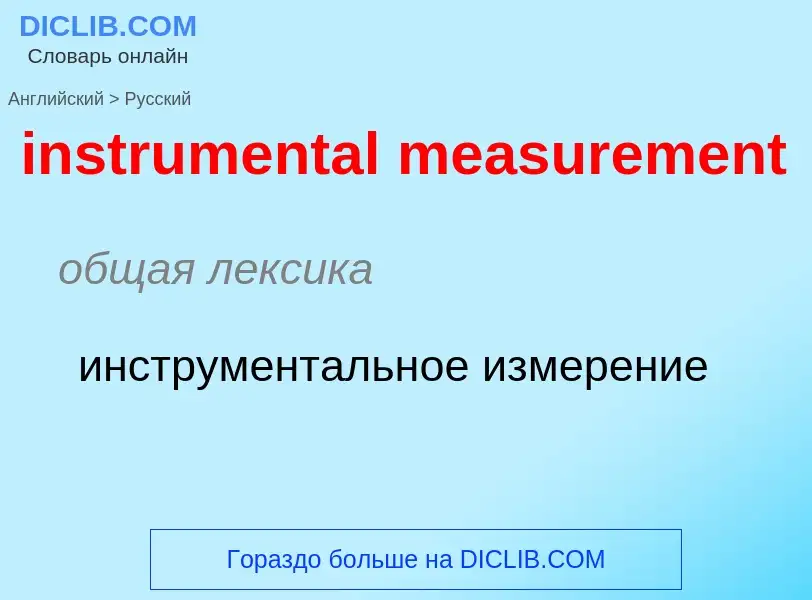Перевод и анализ слов искусственным интеллектом ChatGPT
На этой странице Вы можете получить подробный анализ слова или словосочетания, произведенный с помощью лучшей на сегодняшний день технологии искусственного интеллекта:
- как употребляется слово
- частота употребления
- используется оно чаще в устной или письменной речи
- варианты перевода слова
- примеры употребления (несколько фраз с переводом)
- этимология
instrumental measurement - перевод на русский
общая лексика
инструментальное измерение
[instrə'ment(ə)l]
общая лексика
инструментальный
приборный
способствующий
прилагательное
общая лексика
служащий орудием
средством
играющий важную роль
определяющий
производимый с помощью инструментов
осуществляемый по приборам и т. п.
способствующий (чему-л.)
грамматика
творительный
instrumental case
музыка
инструментальный
в переносном значении
служащий орудием, средством (для чего-л.)
существительное
[instrə'ment(ə)l]
грамматика
творительный
инструментальный падеж
Определение
Википедия
"Instrumental" and "value rationality" are terms scholars use to identify two ways individuals act in order to optimize their behavior. Instrumental rationality recognizes means that "work" efficiently to achieve ends. Value rationality recognizes ends that are "right," legitimate in themselves.
These two ways of reasoning seem to operate separately. Efficient means are recognized inductively in heads or brains or minds. Legitimate ends are felt deductively in hearts or guts or souls. Instrumental rationality provides intellectual tools—scientific and technological facts and theories—that appear to be impersonal, value-free means. Value rationality provides legitimate rules—moral valuations—that appear to be emotionally satisfying, fact-free ends. Every society maintains itself by coordinating instrumental means with value rational ends. Together they make humans rational.
Sociologist Max Weber observed people exercising these capacities and gave them these labels that have stuck, despite scholars constantly coining new labels. Here are his original definitions, followed by a comment showing his doubt that humans are rational to believe that unconditionally right ends can be coordinated with conditionally efficient means.
Social action, like all action, may be...: (1) instrumentally rational (zweckrational), that is, determined by expectations as to the behavior of objects in the environment and of other human beings; these expectations are used as "conditions" or "means" for the attainment of the actor's own rationally pursued and calculated ends; (2) value-rational (wertrational), that is, determined by a conscious belief in the value for its own sake of some ethical, aesthetic, religious, or other form of behavior, independently of its prospects of success; ... ... the more the value to which action is oriented is elevated to the status of an absolute value, the more "irrational" in this [instrumental] sense the corresponding action is. For the more unconditionally the actor devotes himself to this value for its own sake, ... the less he is influenced by considerations of the [conditional] consequences of his action
This article demonstrates the paradox of mutual contamination between instrumental and value rationality by reporting the reasoning of five scholars. Max Horkheimer linked instrumental reason with oppression. Harvard professors John Rawls and Robert Nozick, globally recognised as expert practitioners of value rationality, produced mutually incompatible theories of distributive justice. Neither is universally recognized as legitimate, but both continue to be defended as rational. Emory University professor James Gouinlock and Harvard professor Amartya Sen argued that Rawls and Nozick erred in believing that unconditionally valuable ends can work conditionally. Despite this disagreement, the scholarly community continues to accept as unavoidable this paradox of rationality contaminating itself.

